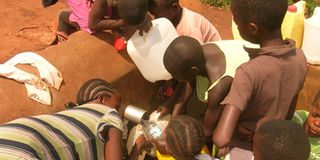Muhakanizi, tell the truth about poverty

Millions of Uganda are said to be unable to access basic needs like clean water.
The issue of poverty concerns not only those who call the shots but each of us in this country, thus attracting debate in the ongoing campaigns.
Mr Keith Muhakanizi’s article “About the poverty puzzle” (Uganda Decides December 20, 2010) cannot go unchallenged by right thinking Ugandans.
According to the MacMillan English Dictionary for Advanced Learners, page 1102 “Poverty is a situation in which someone does not have enough money to pay for their basic needs”. It further states that, “Half of the world’s population is living in poverty.”
And according to the widely held belief of hierarchy of needs of Maslow, these are mainly food, water, clothing, shelter, health and education. The pertinent question to Mr Muhakanizi is, how many Ugandans, approximately numbering now 32 million, can afford the five basic needs mentioned above?
Food issue
This does not mean that the government you are trying to defend is responsible for providing each Ugandan food in his compound, no.
It is the likes of you who would like to give figures which are meant to politicise the situation to satisfy the appointing authority that you are doing the right job while on the ground, there is nothing to show for those “sweetened” figures of yours.
Your much hyped and doctored national household surveys carried out by the very discredited Uganda National Bureau of Standards that showed that Western Uganda has a higher population than the Eastern Region, can be believed.
Have you heard the people of Sebei telling a Presidential candidate that they are tired of “wearing“ your equivalent of Orugabire (rubber sandals from old tires) whereas you proudly assert that the percentage of households with members possessing one pair of shoes increased? You call Orugabire shoes? Shame. What does that mean or how do you interpret that, Mr Muhakanizi? Didn’t you ever hear of this in the 1960s or 1970s in Uganda? Go through a newspaper of that period at Africana Section of Makerere University Library and you will prove this.
Whenever the current presidential candidates have reached to canvass for votes, the first shock they have to come to terms with is the level of poverty. Karamoja has to depend on handouts every year. An old woman starved until she died in Bushenyi District, in Western Uganda, where you say in your article, “Only the Western region saw no statistical significant change in income poverty”?
On unemployment, apart from always mentioning it in passing, what else do your people do about it? Do you have any policy on employment”
On pupil enrollment, even if there is a rise in enrollment, what have you found out about the rate of the dropout? You do not mention this bitter truth because it will damage your candidate’s chance of winning the forthcoming elections, thus affecting your stay in the present job.
On health, Mr Muhakanizi, the 4,321 health centres government has repainted and constructed are helpless to the population as they are mere skeletons without health workers and drugs to make them indeed health facilities. Do you need a PhD or two to know that? How many women are dying during child-birth? How many children die before reaching age five? How many are stunted due to malnutrition because of the level of poverty?
Your statistical indicators are got from playing around with a computer in Ministry of Finance and Economic Planning Offices, which a primary three pupil can do in this era of computer literacy, but they do not show what is on the ground in this country where the majority of Ugandans are using firewood to provide light in their houses, as paraffin costs Shs2,000 per litre (more than $ 1).
Kindly work out correct figures for the purpose of proper planning, not to hoodwink Ugandans to think that things are improving whereas they are not. Over to you, Deputy Secretary to the Treasury, Sir.




